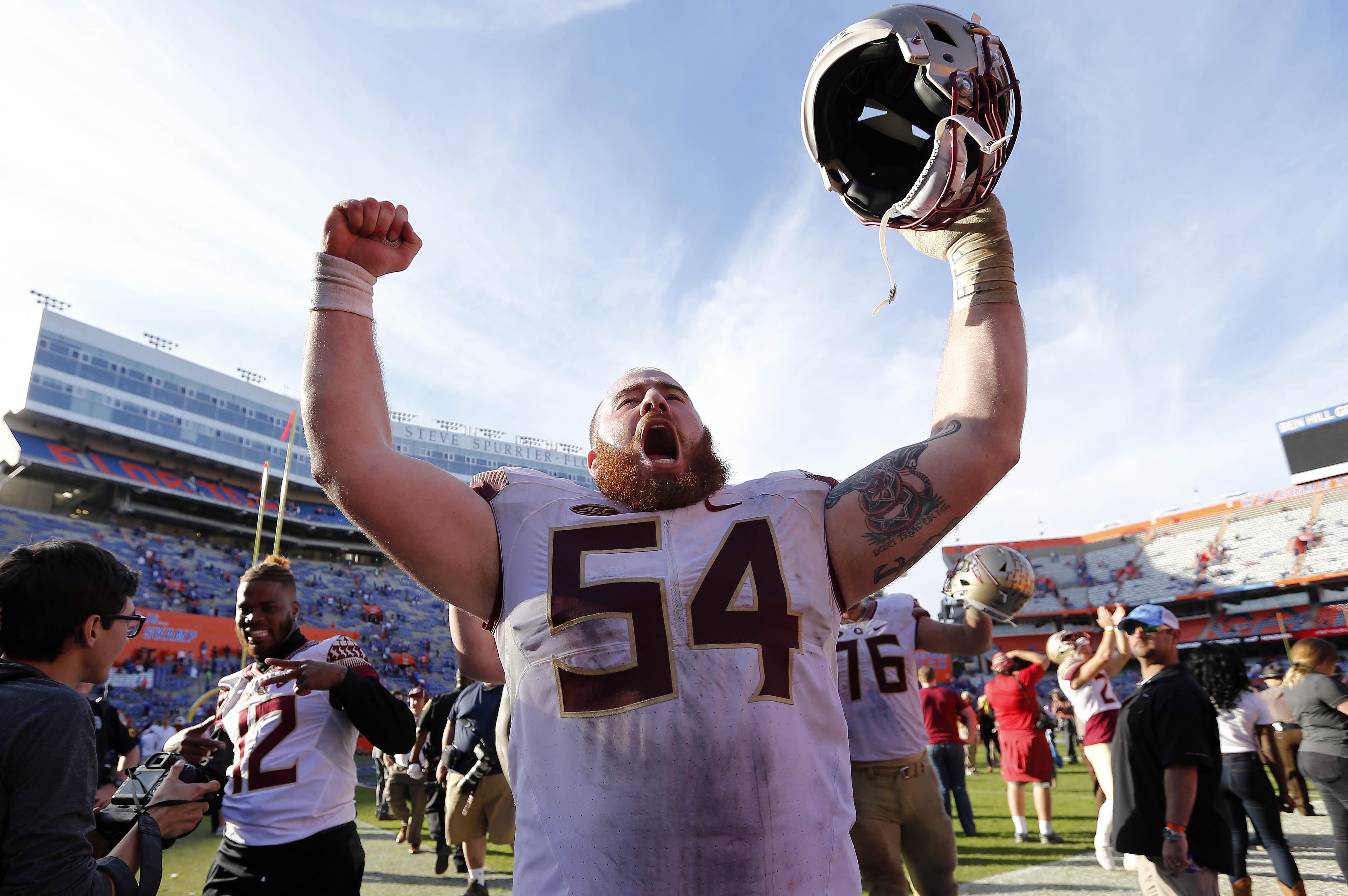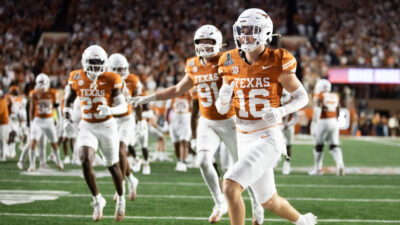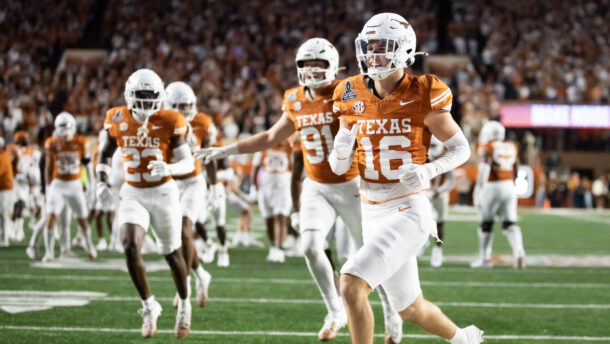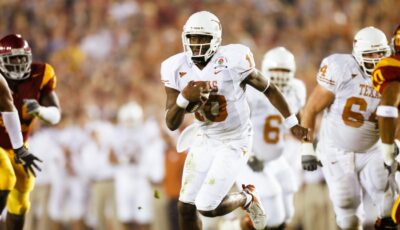
8 reasons Florida State has reclaimed the rivalry and owned Florida this decade
Florida’s regular-season finale at Florida State Saturday will mark the 63rd meeting between Florida’s two oldest public universities, a storied rivalry that started in the 1950s at the request of Florida governor LeRoy Collins. Since 1977, save two instances in the early 2000s, the game has been played on the Saturday after Thanksgiving, the weekend at the conclusion of the regular season traditionally reserved for college football’s most bitter rivalries.
Thanksgiving in the South is a holiday entirely devoted to southern food, family and football, which makes the playing of the Florida-Florida State game on that weekend all the more fitting. Like a Thanksgiving dinner, it’s emotional and noisy and colorful and often not politically correct. It’s a deeply personal game, one that pits brothers against sisters, husbands against wives, bosses against employees. Geographically, the schools are only 150 miles from each other, and most the players in the game grew up playing with or against each other, and the proximity brings familiarity and contempt. When seasons and semesters end, the fan bases live as neighbors and co-workers and the winner looks forward to being able to yap for 12 months.
All-time, the Gators hold a 34-26-2 edge, built largely on the backs of the rivalry’s first two decades, when Florida State managed only three wins and a tie in the first 20 contests. The series became far more even after the arrival of Bobby Bowden in Tallahassee, with Florida edging the Noles in the 1980s (6-4), the Noles besting Florida in the 1990s (7-4-1), when the rivalry took center stage nationally, and Florida holding the edge in the 2000s (7-3).
This decade, however, there has been no such back and forth.
The winner has almost exclusively been the Seminoles.
FSU has won 7 of the 8 games since 2010 and will bring a school-record 5-game winning streak into Saturday’s renewal. To the delight of FSU fans and the agony of Gators, most the games haven’t even been competitive. Florida State’s 7 wins this decade have come by an average of 19 points; only one decided by a touchdown or less.
How did Florida State turn the tide of this rivalry so fast?
Here, in no particular order of emphasis, are eight reasons FSU has reclaimed control of the Sunshine State showdown over the past eight seasons.
The 2010 Game
Urban Meyer is an exceptional rivalry game coach. At Florida, he was 16-2 against Florida’s “Big 3” rivalry group of Tennessee, Georgia and FSU. At Ohio State, he remains undefeated against Michigan.
But in 2010 Tim Tebow was gone, Cam Newton was dismissed and at junior college, his dominance of the SEC was over, his health was failing and his grip on the Florida program fading.
All that was left was his dominance of Florida State, a team he had beaten by an average of 30 points in the prior three seasons.
Jimbo Fisher was in Year 1 replacing the legendary Bowden, and from the day he took the job, he’d emphasize the value of the Florida game to anyone that would listen.
“It starts and ends with how we perform against in-state rivals. From a recruiting perspective, from a goals perspective, the first thing we need to do at Florida State is prove we’re the premier program in the state. We believe we are and have to prove it,” Fisher said ahead of Florida State’s first meeting with Meyer.
The Gators scored first in that game, but FSU dominated thereafter, ripping off 31 unanswered points to set the tone for the rivalry under Fisher.
Meyer would call Florida’s program “a bit broken” after the game, before half-heartedly promising to fix it. He retired for health reasons and to spend more time with his family shortly thereafter. There is no doubt in at least this writer’s mind that the presence of a young and invigorated challenger in Tallahassee helped make that decision easier for Meyer.
Florida’s ineptitude at quarterback
The following players have started the Florida State game at quarterback for Florida this decade: John Brantley (0-2), Jeff Driskel (1-0!!), Skyler Mornhinweg (0-1), Treon Harris (0-2), Austin Appleby (0-1), Feleipe Franks (0-1). That’s seven quarterbacks in eight seasons. Not a single one finished in the top half of the SEC in passing efficiency, and they were even worse against Florida State.
This decade, no Florida QB has thrown for over 200 yards in a game against FSU. Florida has thrown only 4 touchdown passes this decade against the Seminoles; they’ve thrown 7 interceptions.
[table “” not found /]That lack of production has crippled the Gators in this series.
Florida’s offensive coordinator roulette
Florida’s also shuffled through offensive coordinators this decade, with Charlie Weis, Brent Pease, Kurt Roper and Doug Nussmeier all called in to “fix it,” with none of them able to get Florida above 28th in S&P+ offensive efficiency, which is where Florida finished in 2012, the last time it beat the Noles.
How bad has it been?
Florida didn’t even score an offensive touchdown against FSU for nearly three years, ending that stretch of futility last year when Mark Thompson broke a 10-quarter offensive touchdown drought in the first quarter.
Jameis Winston
As bad as Florida’s quarterback play has been, the Seminoles have had some of their program’s best production at the position, beginning with Christian Ponder and E.J. Manuel early in the decade and highlighted by the Heisman-winning performance of Jameis Winston in 2013.
Fisher’s early FSU teams were successful enough to win the ACC and succeed at Orange Bowls. Winston changed the game, and in one masterful 2-minute drill in the last BCS National Championship game ever played, delivered FSU its third national championship.
Winston hammered Florida 37-7 in 2013, and even as he struggled mightily against the Gators in 2014, he was good enough in the second half to win the game anyway.
Florida has simply not had a player in that universe at the QB position since Tebow left campus.
Dalvin Cook
Will Muschamp thought he had landed the electric playmaker at running back the program had been searching for when 5-star Miami Central product Dalvin Cook committed to the Gators in 2013.
Despite Florida’s disaster of a season that fall, Cook continued to profess loyalty to the Gators, until he finally flipped on New Year’s Eve, shortly before Florida State played for the national championship. Muschamp, believing Cook would stick when no one paying any real attention did, was left with almost no backup plan, floating in the wind.
Cook spent the next three years obliterating the Gators, running for 480 yards in three games and averaging an astonishing 6.32 yards per carry against three Florida defenses laden with high-end NFL talent.
Cook, more than any single player this decade, both defined FSU’s dominance in the rivalry and demonstrated the largest reason FSU pulled so far ahead …
Speaking of Dalvin Cook … Recruiting
While the Florida-Georgia game is the SEC’s second-best rivalry and, due to SEC East implications, probably Florida’s biggest on-field football game, the FSU game has the largest impact on recruiting.
For that reason, FSU might be Florida’s largest rival, as recruiting is the lifeblood of any program.
How much does it matter to win this game?
According to Bill Sikes, former regular on the Gators podcast Gators Breakdown who has thoroughly researched recruiting in the state of Florida over the past two decades, the winner of the Florida-Florida State game has finished with a higher-ranked recruiting class than the loser for the past 13 seasons. The average rank of the winner’s class in that period? Fourth.
That’s astounding and demonstrates how big a deal it is when one school gets on a roll in this football game.
Jimbo Fisher
Fisher isn’t without his flaws, especially as a somewhat predictable play-caller when he lacks an elite quarterback.
But he was always locked in for rivalry games in Tallahassee, going 14-2 against FSU’s two largest rivals, Florida and Miami.
Fisher has always been an elite recruiter, and his ability to put — and keep — together a staff that consistently recruited balanced, blue-chip heavy classes helped FSU flip the script in a rivalry where Florida consistently had better talent in the decade prior to Fisher’s arrival.
McElwain didn’t “get it”
Jim McElwain’s mantra at Florida was always that “every opportunity to compete is a great opportunity.” That’s a Saban-like view and it works for Nick because of his staff’s ability to recruit and their impeccable attention to detail.
It doesn’t work everywhere because — surprise, surprise — not every coach is Nick Saban and the reality is that in some places, you have to acknowledge that some games are larger than others.
Fisher knew this about Florida-Florida State. Saban has learned it about the Iron Bowl, the one game that has given him a bit of trouble in Tuscaloosa.
Florida-Florida State is one of those games. It’s not “just another game.” Urban Meyer understood that during his tenure in Gainesville. Steve Spurrier might have always wanted to beat Georgia more, but he knew he needed to compete and beat FSU if Florida was to compete for national championships. Bobby Bowden knew and valued this game above all others in Tallahassee, which is part of the reason that despite Spurrier’s fire, the Noles and Bowden were the one team Spurrier’s mighty Florida empire couldn’t always figure out.
McElwain didn’t get the magnitude of this game. He wrote off his first loss to FSU because, to quote, “we’re going to Atlanta, aren’t we?” That kind of attitude is why he only lasted two editions of this rivalry game.
The hope in Florida’s fan base is that in Mullen, Florida once again has a coach that understands the magnitude of this rivalry game and will make winning it a big priority in Gainesville.
Neil Blackmon covers Florida football and the SEC for SaturdayDownSouth.com. An attorney, he is also a member of the Football and Basketball Writers Associations of America. He also coaches basketball.







